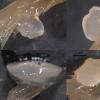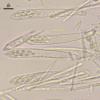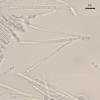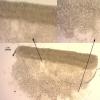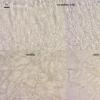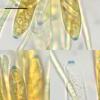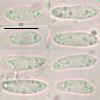
24-02-2026 11:01
Gernot FriebesHi,found on a branch of Tilia, with conidia measur

23-02-2026 11:22
Thomas Læssøehttps://svampe.databasen.org/observations/10584971

29-11-2024 21:47
Yanick BOULANGERBonjourJ'avais un deuxième échantillon moins mat

07-02-2023 22:28
Ethan CrensonHello friends, On Sunday, in the southern part of

19-02-2026 17:49
Salvador Emilio JoseHola buenas tardes!! Necesito ayuda para la ident

19-02-2026 13:50
Margot en Geert VullingsWe found this collection on deciduous wood on 7-2-
The first was collected earlier in hollow on dead and alive Sphagnum balticum branches.
Apothecia at first turbinate, then cupulate, and later with concave hymenium, sessile, basal part translucent, gelatinous, edge and hymenium white to slightly yellowish, 1–2 mm in diameter, 0.4–0.8 mm thick.
Excipulum at base from prismatic cells, becoming more cylindrical to the edge, end cells cylindrical, about 25 x 4 mk; hyphae of outer gelatinous layer 3.5–4 mk broad; medulla from sosage-shaped to ellipsoid cells, near 50 mk long, 10–15 mk broad; asci clavate, with crozier, euamyloid ring, 70–83 x 9–10.7 mk; paraphyses cylindrical, about 73 x 3 mk; spore ellipsoid, some slightly curved, slightly heteropolar, with many small oils, 12.6 (11.3–13.7) x 4 (3.8–4.2) mk (n=13).
Date of collection: 15.07.2013, Coordinate: N60,891581° E68,683899°.

Zotto
and actually these two samples (above described and "Discinella shimperi" published earlier http://www.ascofrance.com/search_forum/21673) were collected 10 m nearby.
But "Discinella" was growing on living branches among green leaves (Sphagnum papillosum), and apothecia were smaller and lacking gel tissie. On the contrary, "Pezoloma" was collected from dead branches (Sphagnum balticum), apothecia larger and have distinct gel at the base. Vacuoles in spores here less pronounced, right.
At first sight, all three specimens remind each other. The "hairs" at the edge of apothecia of second "Pezoloma" (you said Hyaloscypha-like) are more likely outgrowths of excipular hyphae. But spores in this specimen are much smaller. I will look again in the same spot, if there could be changes with age.
Nina.

